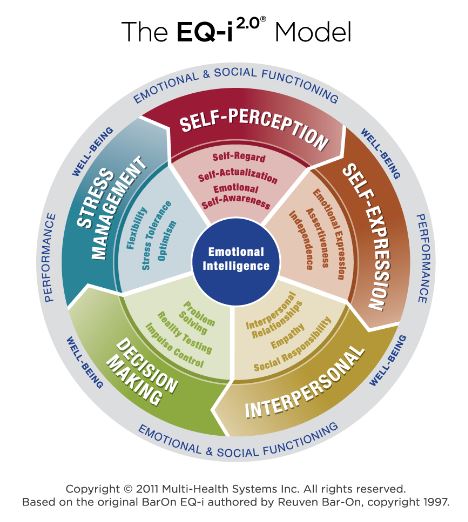Get Unstuck and Empowered with Emotional Intelligence
In this day and age when talent is in high demand are you losing your top people to your competition? Worse yet, are you losing your people to disinterest and apathy? Are your employees disengaged?
If you answered YES to any of these questions, it’s time for your organization to focus on emotional intelligence.
Emotional Intelligence (EI) is the ability to use the information our emotions provide to act appropriately in the face of daily challenges. Emotional Quotient simply measures a person’s level of emotional intelligence; similar to how IQ is a measure of cognitive intelligence.
People with high EQ scores are more aware of themselves, better able to regulate their actions, and have more empathy for others. An increased level of emotional intelligence can also help individuals manage stress better, build healthier relationships, and be more effective at work. These qualities are all key elements of effective leadership and are crucial skills to build regardless of whether you have just entered the workforce, or are a seasoned professional.
There are three major models of emotional intelligence, according to the Encyclopedia of Applied Psychology (2004):
- The Mayer-Salovey model breaks emotional intelligence down into four branches – perceiving emotions, reasoning with emotions, understanding emotions, and managing emotions.
- The Goleman model describes five components of emotional intelligence – self awareness, self regulation, motivation, empathy and social skills.
- The Bar-On model distinguishes emotional intelligence into five different subscales – intrapersonal, interpersonal, stress management, adaptability and general mood.
Based on Dr. Bar-On’s pioneering model of emotional-social intelligence, Multi-Health Systems (MHS) has developed two online assessments called the Emotional Quotient Inventory (EQ-i) and the EQ-i version 2.0®. These assessments have been taken by over one million individuals worldwide, and together are one of the newest scientifically developed and validated measures of emotional intelligence available.
The EQ-i 2.0® model developed by MHS, includes five composite scales (Self-Perception, Self-Expression, Interpersonal, Decision Making, and Stress Management), which can be further broken down into 15 emotional intelligence competencies. The only way to improve your EI is to work on enhancing these competencies.

Here are three EI competencies that you can begin to build on this week: emotional self-awareness, empathy and impulse control.
Emotional Self-Awareness
Self-improvement is not impossible without emotional self-awareness; you need to know what you need to get better at, before you can get better. Understanding your own needs, beliefs, desires, strengths, weaknesses, triggers – everything that makes you tick, everything that makes you unique – is critical.
A great way to to improve your emotional self-awareness is to conduct an “emotions autopsy”. In order to be aware of and process any situation, you need to break down the experience into chunks of information. Ask yourself these questions to enhance your self-awareness, understand any scenario, and learn how it impacts your emotions:
- What do you see?
- What do you think?
- What do you feel?
- What do you want?
- What do you do?
- What are the benefits?
- What are the risks?
Empathy
Empathy, for some people comes naturally, for others it can be a challenge. Empathy is the ability to pay attention to and appreciate the feelings of others. It requires us to see things from another person’s perspective. Understanding what others are feeling is necessary if we want to form healthy, meaningful, and lasting relationships.
Empathy involves accurately hearing what others are communicating at both an intellectual and an emotional level. It requires you to refrain from judgment, truly listen, and have a genuine level of interest in the other person.
Here are a few ways you can start to make empathy a habit:
- Have a limitless curiously about strangers.
- Try to empathize with your “enemies”.
- Actively listen and be open to new ideas.
Impulse Control
Impulse Control is the ability to resist or delay an impulse, drive, or temptation to act. There are many ways to eliminate reacting impulsively.
If you struggle with impulse control, try some of these tips next time you feel that your impulses are getting the better of you:
- Identify any prompts that may be causing you to act impulsively.
- Once you become aware of your impulse triggers, find something to distract yourself, such as walking away and taking a deep breath.
- Create a time buffer between your emotional triggers and your impulsive reactions.
- Try to talk about what is bothering you with someone who you trust.
- If you resist acting impulsively, treat yourself with something that you find pleasurable.
Emotional intelligence benefits all areas of life. In business, it can be your new best friend. EI skills, such as effective communication, conflict management, relationship-building, and stress management, are all critical for career success. In fact, Human Resources professionals insist that while a high IQ might get someone hired, a high EQ will get them promoted!
Carolyn Stern is presenting Leading with Emotional Intelligence workshops in Victoria on July 25 and in Vancouver on August 14. For more information on these and other professional development opportunities, please visit cphrbc.ca.
Carolyn Stern, a member of CPHR BC & Yukon, is a successful entrepreneur who specializes in helping professionals get unstuck. As a life-long learner and academic, Carolyn is a professor, corporate trainer, certified Emotional Intelligence Expert, author, and professional speaker. Find out more at carolynstern.com.









